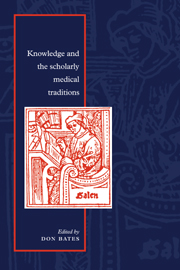Book contents
- Frontmatter
- Contents
- List of illustrations
- List of contributors
- Acknowledgements
- 1 Scholarly ways of knowing: an introduction
- Part 1 Scholarly medicine in the West
- Part 2 Chinese traditional medicine
- 9 Text and experience in classical Chinese medicine
- 10 Visual knowledge in classical Chinese medicine
- 11 A deathly disorder: understanding women's health in late imperial China
- 12 Re-writing traditional medicine in post-Maoist China
- Part 3 Āyurvedic medicine
- Part 4 Commentaries
- Index
9 - Text and experience in classical Chinese medicine
Published online by Cambridge University Press: 01 February 2010
- Frontmatter
- Contents
- List of illustrations
- List of contributors
- Acknowledgements
- 1 Scholarly ways of knowing: an introduction
- Part 1 Scholarly medicine in the West
- Part 2 Chinese traditional medicine
- 9 Text and experience in classical Chinese medicine
- 10 Visual knowledge in classical Chinese medicine
- 11 A deathly disorder: understanding women's health in late imperial China
- 12 Re-writing traditional medicine in post-Maoist China
- Part 3 Āyurvedic medicine
- Part 4 Commentaries
- Index
Summary
Qualifications and lineages
What were the qualifications of physicians in ancient China? Who judged them? Were they unique to medicine? Few records survive from the centuries in which medicine emerged from the domain of the hereditary artisan to become a cumulative tradition, with its doctrines, not merely its techniques, transmitted in books. This process hardly began earlier than the unification of China in 221 BC, and was not fully accomplished before the first century. I will begin with two sources, one from the second century BC and one from perhaps a century later, that throw light on what made a doctor.
The first is a long memorial in the biography of Ch'un-yü I in the first of the Standard Histories, Memoirs of the Grand Historian (c. 100 BC). Ch'un-yü was descended from a noble family of presentday Shan-tung province that claimed to have held its fief for a millennium. He was Director of Granaries for the state of Ch'i. This position, if typical, was not a career but a sinecure passed down in his family. Fond of medicine in his youth, in 180 he began three years of study that made him the successor of an eminent doctor of his own village. He wandered from one court to another doctoring aristocrats and their women ‘rather than treating his home as a home’ as people of good family were expected to do. The historian makes the point that ‘in some cases he did not treat people's medical disorders, which aroused resentment in many sick people’.
- Type
- Chapter
- Information
- Knowledge and the Scholarly Medical Traditions , pp. 177 - 204Publisher: Cambridge University PressPrint publication year: 1995
- 25
- Cited by

